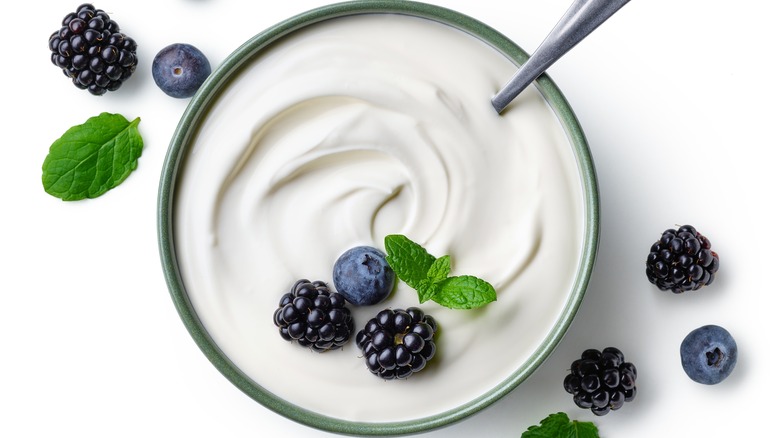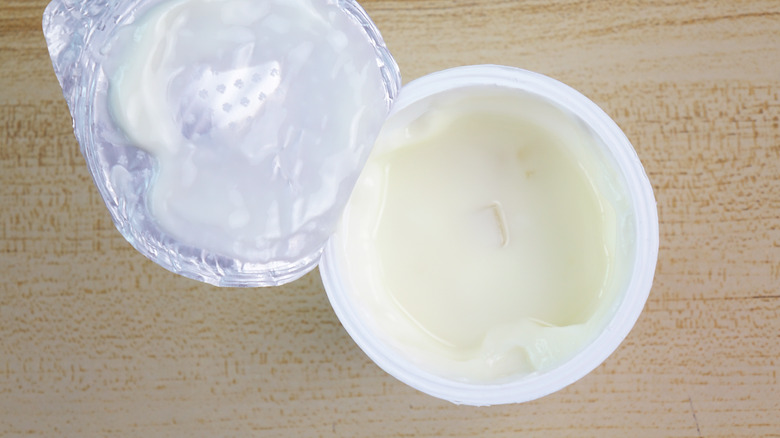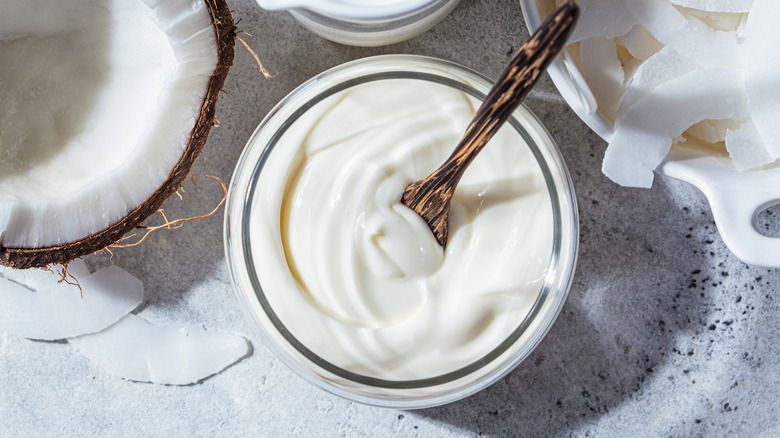False Facts About Yogurt You Thought Were True
Yogurt, the creamy, tangy, and deliciously smooth dairy product, has been a staple in diets around the world for centuries. Throughout history, it has been revered for its health benefits and nutritional value. It found its way into the diets of various civilizations, from the Egyptians and Greeks to the Romans and beyond. Over time, yogurt evolved from a simple fermented dairy product to a global phenomenon, cherished for its versatility and flavor.
Yogurt is created by fermenting milk with live bacteria cultures. Its tangy flavor and thick texture make it a versatile ingredient in both sweet and savory dishes. Rich in protein, calcium, and probiotics, yogurt offers numerous health benefits, and it's no wonder it has earned a spot in the refrigerator of many health-conscious consumers. However, amid the sea of information surrounding this much-loved foodstuff, there are many misconceptions.
We're here to debunk the false facts about yogurt that you may otherwise have overlooked. As we delve into the world of yogurt myths, prepare to have your assumptions challenged. From its ability to spoil to the true extent of its health benefits, yogurt calls for learning the basics. It's time to separate fact from fiction. Read on to equip yourself with a newfound understanding of yogurt's intricacies so you'll be ready to navigate the dairy aisle with confidence.
False: Yogurt can't spoil
It's often thought that yogurt won't cause you any problems if consumed way past its expiration date, but don't be fooled -– it can indeed go bad. Contrary to popular belief, yogurt is not immune to spoilage. While the live bacteria cultures present in yogurt can act as natural preservatives, they don't offer indefinite protection.
The exact shelf life of yogurt varies depending on factors such as storage conditions, the type and brand of yogurt, and whether it's been opened. However, according to the U.S. Department of Agriculture, the general rule of thumb is that yogurt should be stored at a temperature of 40 degrees Fahrenheit or below and eaten within two weeks of purchase. After this time, yogurt becomes susceptible to contamination from potentially harmful bacteria, which can lead to spoilage.
It's also important to use your senses to judge whether yogurt is safe to consume. Signs that yogurt has gone bad include a foul smell, unusual coloration, or lumpy texture. While mold might not always be immediately visible on the surface, it can lurk beneath, posing a health risk if consumed. Consuming spoiled yogurt can lead to food poisoning, with symptoms ranging from mild gastrointestinal discomfort to more severe complications, especially in individuals with weakened immune systems. Therefore, it's crucial to practice proper food safety measures, including checking the expiration date, storing yogurt at the correct temperature, and discarding any yogurt that shows signs of spoilage.
False: Yogurt is only good for digestion
Yogurt has a strong reputation as a digestive aid, but its benefits actually extend far beyond this. While it's true that yogurt contains probiotics — beneficial bacteria that support gut health — it also offers a variety of nutrients and other important health perks that shouldn't be overlooked.
The probiotics found in many yogurts can help maintain a healthy balance of gut flora, aiding in digestion, reducing inflammation, and potentially alleviating gastrointestinal issues like bloating and constipation. However, yogurt is also a rich source of essential nutrients such as calcium, vitamin B12, potassium, and phosphorus. A cup of yogurt can contain up to one third of your recommended daily intake of calcium, which is essential for healthy bones and teeth, hormone function, and muscle contraction. The impressive dose of vitamin B12 found in yogurt (up to half of your recommended daily amount) also plays a crucial role in red blood cell formation, nerve function, and DNA synthesis.
In addition, yogurt stands out as a significant source of protein, which is vital for muscle growth and repair. Typically containing around 8 grams to 12 grams of protein per serving, yogurt is an excellent option for those looking to meet their daily protein needs. The many different brands of Greek yogurt, known for a thicker consistency, can have even higher levels of protein.
False: All yogurt is created equal
When browsing the yogurt aisle, it's easy to assume that all yogurt varieties offer similar nutritional benefits. However, this isn't the case. The nutritional content of yogurt can vary significantly depending on a range of factors.
For example, if we compare Greek yogurt and regular yogurt, there is a major difference in protein content. Cup for cup, there can be almost double the amount of protein in Greek yogurt than in the regular form. This is due to the straining process involved in making Greek yogurt, where much of the liquid (or whey) is removed. Another outcome of this straining is a much lower lactose content. Yogurt made from plant-based alternatives like soy, almond, or coconut may also offer different nutritional profiles compared with dairy-based yogurts. These options are well-suited to those following a vegan diet or having a lactose intolerance or dairy allergy, but they may be lower in certain nutrients typically found in dairy products, such as calcium and vitamin D.
There can also be variation in the probiotic nature of different yogurts. All yogurts inherently contain live cultures, integral to the fermentation process that transforms milk into yogurt. However, some undergo pasteurization during production, extending shelf life but eradicating beneficial bacteria. In this case, manufacturers may then supplement the yogurt with additional strains after pasteurizing. To ensure you're selecting a yogurt with active probiotics, check the labels. If present, specific strains, like Lactobacillus bulgaricus, Lactobacillus casei, and Bifidobacterium, should be listed.
False: Yogurt is always a healthy choice, regardless of the type
It's a common misconception that all yogurt varieties are inherently healthy. This assumption overlooks the significant differences in nutritional content among different types.
For instance, full-fat yogurt made from whole milk tends to be higher in calories and saturated fat compared with low-fat or non-fat varieties that use skimmed milk. While these fats can contribute to satiety and flavor, they may not align with certain dietary preferences or health goals. Similarly, flavored yogurts often contain added sugars or artificial colors and flavorings, which can detract from their nutritional value.
To reap the maximum nutritional benefits from yogurt, read nutrition labels carefully and opt for a plain or Greek variety with minimal added sugar or sweeteners. These tend to be higher in protein, lower in fat, and made with simple, natural ingredients. If you're missing that touch of sweetness in your yogurt bowls, why not opt for a handful of fresh berries or drizzle of honey? The result will be a far more nutritionally dense meal, with no need to compromise on taste!
False: Yogurt can be a complete meal substitute
While yogurt is undoubtedly a nutritious food choice, it falls short of providing all the essential nutrients needed for a balanced meal. Despite its protein, calcium, and probiotic content, yogurt is lacking in other crucial components necessary to qualify as a complete meal substitute.
For instance, a typical serving of yogurt may not contain adequate amounts of carbohydrates, fats, and fiber to sustain energy levels and promote satiety throughout the day. Consuming yogurt alone as a meal replacement may leave you feeling hungry and unsatisfied, which means you might be more likely to reach for unhealthy snacks later on. Relying solely on yogurt as a meal substitute may result in nutrient deficiencies over time, as it doesn't provide the full spectrum of vitamins and minerals found in a well-rounded meal. Essential nutrients like vitamins A and C, as well as iron , are often lacking in yogurt alone.
To ensure a balanced diet, it's essential to complement yogurt with other nutrient-rich foods, such as whole grains, fruits, vegetables, lean proteins, and healthy fats. Incorporating yogurt into meals and homemade snacks can enhance their nutritional value and contribute to a diverse, healthy diet. However, it's essential to view yogurt as a component of a meal rather than a complete meal substitute to support overall health and wellness.
False: Flavored yogurts are just as healthy as plain ones
While flavored yogurts may be enticing due to their sweet and fruity taste, they often contain added sugars, artificial sweeteners, and flavorings. Even some yogurt products that are marketed as "low-fat" or "fat-free" may compensate for the reduced fat content by adding more sugar or artificial ingredients to improve taste and texture. Shockingly, some flavored yogurts can contain a whopping 7 teaspoons of sugar.
These added sugars can significantly increase the calorie content of flavored yogurts and contribute to excess sugar intake, which is linked to various health issues such as obesity, Type 2 diabetes, heart disease, and dental problems. Additionally, sugar can cause spikes and crashes in blood sugar levels, leading to drastic energy fluctuations.
So, what about yogurts that contain fruit? Well, the key here is to look for varieties that contain whole pieces of fruit rather than juices or concentrates. This is because the removal of the skin and pulp during the juicing process removes many essential nutrients from fruit, and the sugar content becomes much more concentrated. Therefore, a portion of a whole fruit will contain more fiber, less sugar, and more vitamins and minerals than its concentrated counterpart.
False: Vegan yogurt lacks nutritional value
Vegan yogurt, made from plant-based alternatives like soy, almond, or coconut milk, offers its own unique benefits, such as being suitable for individuals with lactose intolerance or dairy allergies. However, it is often dismissed as lacking the nutritional punch of its dairy-based counterparts. This is a misconception, which overlooks many of the nutrients found in these non-dairy options.
Plant-based yogurts often contain beneficial fats, vitamins, and minerals derived from their plant sources. The nutritional profile may be different to that of dairy-based yogurts, but it can still offer a wide array of health benefits. "Plant-based yogurts overall have less total sugar, less sodium and more fiber than dairy, but they have less protein, calcium and potassium than dairy yogurt," states researcher Astrid D'Andrea from the University of Massachusetts Amherst. In fact, in her study published in the journal Frontiers in Nutrition, it was found that the most nutrient dense form of all yogurt was that made from almond milk.
Additionally, many vegan yogurt manufacturers fortify their products with essential nutrients such as calcium, vitamin D, and B12 to match or even exceed the nutritional content of dairy yogurt. Choosing these fortified options, and consuming vegan yogurt alongside a variety of other plant-based foods, is a great way to reap its health benefits while supporting your dietary preferences and nutritional needs.
False: Freezing yogurt destroys its health benefits
The misconception that freezing yogurt compromises its nutritional value is widespread but unfounded. In reality, freezing yogurt is a practical way to preserve its essential nutrients, including probiotics, vitamins, and minerals, ensuring they remain intact until consumption.
Probiotics, the beneficial bacteria found in yogurt, are remarkably resilient and can withstand freezing temperatures without significant loss of potency. These live cultures continue to exert their positive effects on gut health even after the yogurt is thawed, maintaining their ability to support your digestive health. Moreover, freezing yogurt can extend its shelf life, allowing consumers to stock up on this nutritious dairy product without fear of spoilage. Whether used as a base for smoothies, blended into frozen treats, or enjoyed as a refreshing snack, frozen yogurt is a convenient and versatile staple to have stored in your freezer.
It is important to note that freezing yogurt may alter its texture. If you plan to thaw the yogurt before using, this can cause it to become slightly grainy and thin due to separation of the liquid from the milk solids. Giving the thawed yogurt a good stir can help to revive its originally smooth texture.
False: Yogurt is not suitable for lactose-intolerant individuals
You might assume that dairy yogurt is off-limits for those with lactose intolerance. However, that isn't always the case. While traditional dairy yogurt contains lactose, the naturally occurring sugar found in milk, some lactose-intolerant individuals find they are actually able to consume yogurt without experiencing adverse symptoms.
It has been found that digestion of lactose is facilitated by live cultures present in yogurt. The bacterial lactase found in yogurt, which helps to break down lactose, can endure stomach acidity when aided by yogurt's buffering capacity. As yogurt moves into the small intestine, where pH increases and transit slows, lactase remains active, effectively digesting lactose.
Many types of yogurt also contain lower levels of lactose or none at all. For example, Greek yogurt contains around half the amount of lactose that regular yogurt does, at less than one gram per ounce. This is due to the removal of whey during the straining process. Dairy-free yogurts made from plant-based alternatives like soy, almond, coconut, or oat milk are also free from lactose and offer a suitable option for those with lactose intolerance or dairy allergies.
False: More probiotics equals better yogurt
The belief that a higher quantity of probiotics equates to a superior yogurt product is not entirely true. The quantity of probiotics, measured in colony forming units (CFU), refers to the total number of live and active cultures present in the yogurt, which can influence the overall potency and effectiveness of the product. However, a high CFU is not considered to be the most important factor when it comes to choosing probiotic foods. The number and types of strains are actually the best measures to consider.
The human gut is home to a diverse ecosystem of bacteria, and yogurts that contain a wider variety of probiotic strains from different sources may be more beneficial than those containing fewer strains. Different strains of probiotics each offer their own unique health benefits, with each targeting different aspects of gut health. Some may aid digestion or fight infection, while others boost brain function or reduce inflammation. And some strains may offer synergistic benefits when combined.
Moreover, a diverse gut microbiome is associated with better overall health and reduced risk of chronic diseases. Therefore, consuming yogurt with a wider range of probiotic strains can provide more comprehensive and well-rounded support to your gut health.
False: Yogurt causes weight gain
Dispelling the myth that yogurt contributes to weight gain is essential for understanding its role in a balanced diet. Contrary to popular belief, yogurt can be a valuable ally in weight management due to its nutrient composition and satiating properties. Studies have shown an association between eating yogurt and having a lower body mass index, body fat percentage, and waist circumference. But what's the reasoning behind this? Firstly, yogurt is rich in protein, which helps promote feelings of fullness and reduces appetite, ultimately supporting weight-loss efforts. Incorporating protein-rich foods like yogurt into healthy meals and snacks can aid in weight management by reducing overall calorie intake throughout the day.
Furthermore, the probiotics found in yogurt might be beneficial not only to your gut health. A number of studies have also proposed potential weight-loss benefits associated with probiotics, particularly those containing Lactobacillus strains. For instance, research in the Journal of Functional Foods found that when overweight adults consumed 3.5 ounces of yogurt containing Lactobacillus amylovorus daily, it led to more significant loss of body fat compared with those who ate yogurt lacking in probiotics.
Opting for plain or Greek yogurt over flavored varieties is also your best bet for reducing added sugar intake, which can be a significant contributor to weight gain and obesity. With sugar being high in calories while providing very little nutritional value, its consumption is best kept to a minimum when trying to manage weight.











